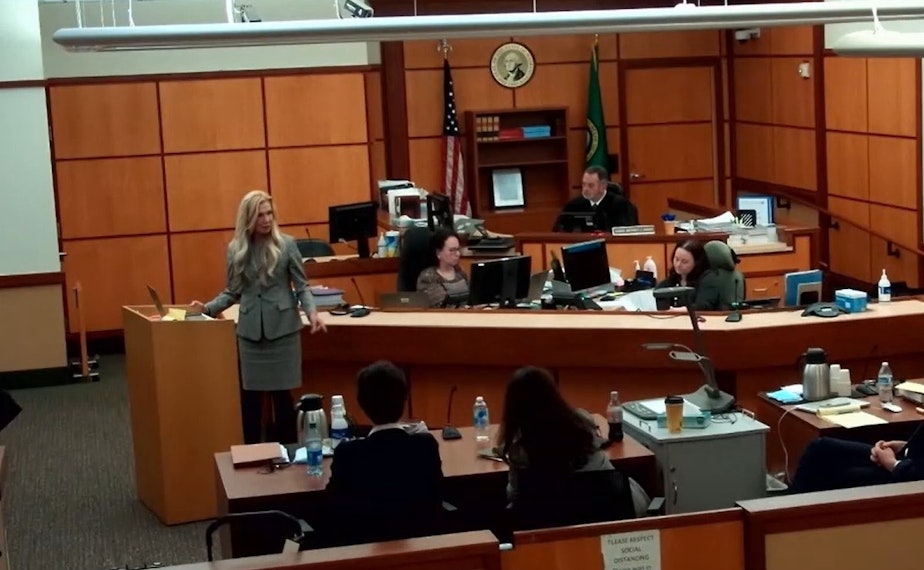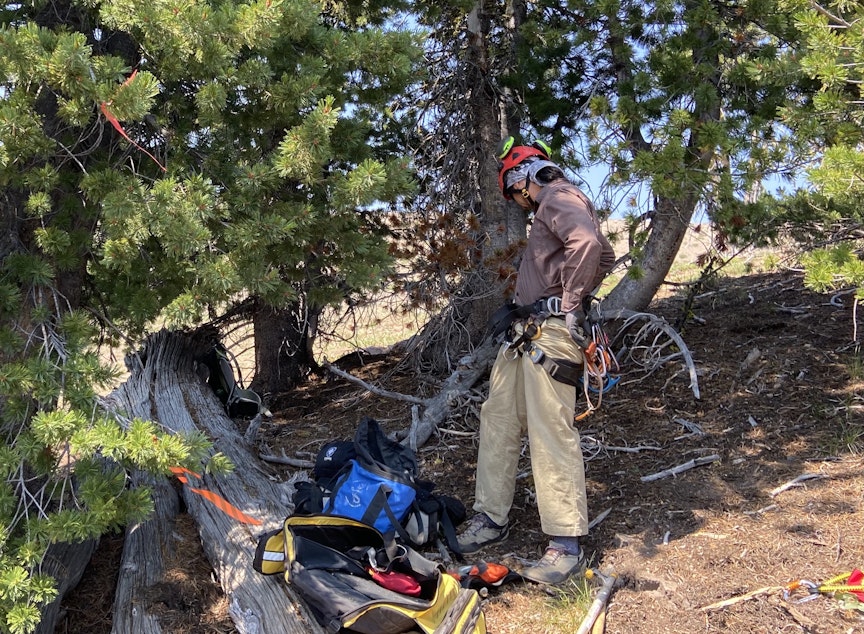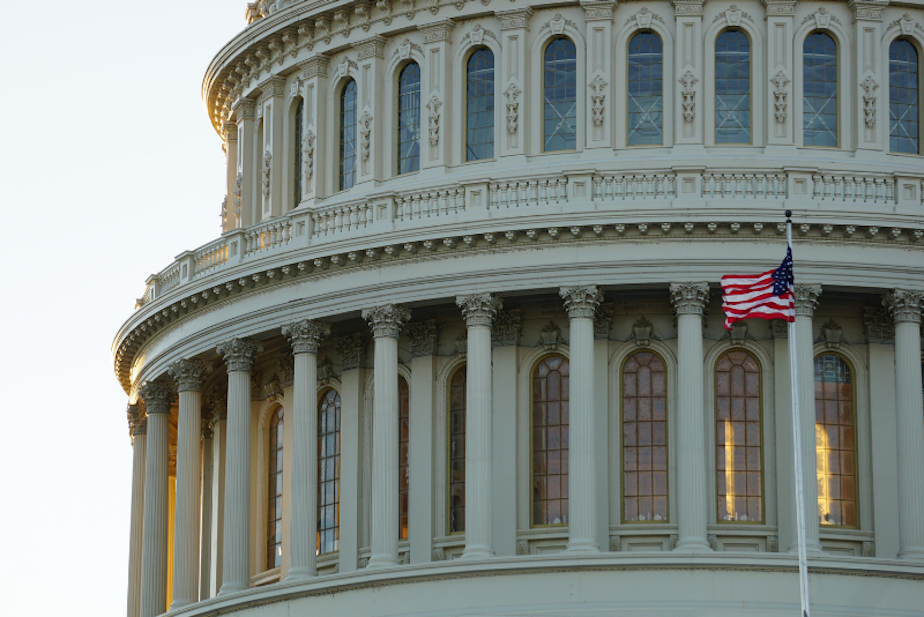What is legal, what is logical, and what happened: Today So Far

- Pierce County Sheriff Ed Troyer has been found not guilty by a jury.
- Housing and homelessness are a major focus of Gov. Inslee's new proposed budget.
- Hospitals face a considerable funding crisis while flu and Covid cases rise.
This post originally appeared in KUOW's Today So Far newsletter for December 15, 2022.
Pierce County Sheriff Ed Troyer is not guilty, according to a jury's conclusion that came down last night.
Troyer was charged by the state with false reporting and making a false or misleading statement to a public servant. He was acquitted of both charges. The state accused the sheriff of telling a dispatcher one thing (that a Black newspaper carrier threatened to kill him), and then telling responding officers something else. Troyer said that was not the case, and that he did tell officers he was threatened, but that they reported otherwise. The state argued that Troyer was not threatened, he was disrespected (perhaps not just by the newspaper carrier, but later, when officers called him a "douchebag" in private messages).
Troyer has laid out a counter narrative, which basically says that the attorney general and governor were going after him, and the media was targeting him. “The media’s made me out to be a racist, and the state’s made me out to be a liar,” is the big quote that emerged from his testimony.
There are a lot of angles to the Troyer trial (and there will be more legal challenges over this), but a big issue here is one that I've seen happen in a lot of cases: What is legal and what is right/wrong. They're not always the same. Without getting into the specifics of the case (I'm not a lawyer), sometimes there is what is written down in the law, and therefore what juries are deciding on, and then there is what the rest of us are thinking.
It's 2021, you're a sheriff, but you're in a city's jurisdiction, and you see something suspicious. Just call 911 right away. Why are you getting up close and nosy like that one annoying neighbor everybody avoids (and who always seem to mess with delivery drivers)? If you really think you're spotting a thief, a porch pirate (in the early a.m. hours when no deliveries are being made), then stay in your lane and call the appropriate authorities. Do you honestly think that if you, the sheriff, calls a dispatcher, you're not going to get every patrol car within radio distance? That seems logical to me, but it's not what happened. That's the sort of conversation I've had. But that's not the same conversation a jury is charged with. We're all likely to eventually hear the reasoning behind the jury's decision. My Dyer prediction is that it could fall along these lines.
Sponsored
KUOW's Amy Radil has covered this trial well over the past couple weeks. Check out her coverage here.
Washington Gov. Jay Inslee has put forth his budget proposal for next year. As I brought up yesterday, this proposal places a significant focus on housing. The proposal still has to be approved by lawmakers, but if Inslee's plan gets a thumbs up, voters may have to ultimately decide whether or not they want the state to spend $4 billion to address affordable housing and homelessness. As the Associated Press reports, that money will likely come from bonds.
We're not in the "pandemic era" anymore. At least, not like we were over the past couple years.
I'll say that in another way — we are not experiencing the pandemic anymore, however, our medical and emergency systems are still in a similar state as during the lockdown times. Currently, Washington's hospitals face a dire financial situation. Revenues are not covering expenses.
The concept a lot of people had difficulty understanding during the pandemic is that we were trying to protect our hospitals from becoming overwhelmed. So while it's great that Covid wasn't bad for you, it was still bad for the next person, and the person after that who got sent to hospitals. If Covid patients fill all the rooms, that's bad news for the heart attack patient, or the car crash patient — there's just not enough medical personnel, beds, and funding to go around.
Sponsored
Today, we are faced with an explosion of flu, Covid, and RSV. Just as before, this is a threat to our medical system, and its capacity to care for you when you need it.
This has prompted an updated conversation around masking. Going back to my point above about what is legal and what is right/wrong — it's not likely that any mask mandates will be coming along, but masking up is still a smart thing to do. It seems our current era will be one where some people mask up, and others don't.
AS SEEN ON KUOW

Tree climber Phil Chi does one last safety check before he climbs to the top of a whitebark pine tree. The federal government announced this week that it is designating whitebark pine trees as "threatened" and placed the trees on the Endangered Species List. (Northwest News Network)
Sponsored
DID YOU KNOW: Whitebark pine trees
You probably don't see too many whitebark pine trees around the Puget Sound area. These trees are generally found at the highest mountain elevations. They are common in the Cascades up through British Columbia. They can also be found as far as Wyoming and in the Sierra Nevada mountains in California. Because they are so high up in the mountains, they often mark the tree line.
There are a few reasons why they are threatened, and have been put on the endangered species list. Among that list is "White pine blister rust," which is a fancy term for a fungus. This fungal disease comes from Europe and has infected most of the whitebark pines in the USA. There is an estimated 5% of these trees that have a genetic resistance to the fungus. Some restoration efforts so far have involved taking seeds from such resistant trees and planting saplings in the mountains.
ALSO ON OUR MINDS

Sponsored
Poll: Americans want compromise, but have no confidence Congress will work together
Three-quarters of Americans say they want members of Congress to compromise with the other side, the highest in at least a decade. But Americans have gotten more pessimistic that their leaders will try to reach across the aisle. The 58% who said they have no confidence Congress will do so is more than double the level found in 2008, when just 23% said so.

